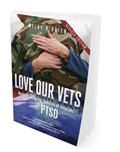Love our vets . . . and their families
Rebecca Davis
AFA Journal staff writer
June 2017 – Seventy-three years ago this month, on the beaches of Normandy, France, Allied troops gained a military foothold that led to the defeat of Nazi Germany. With the D-Day invasion came death and injury of more than 9,000 Allied soldiers. Many who survived bore scars – physically, emotionally, mentally, and spiritually – for the rest of their lives.
What is PTSD?
PTSD, post-traumatic stress disorder, is a serious condition that affects veterans, their loved ones, and anyone who has been exposed to “severe trauma such as an accident, assault, tragic loss of a loved one, disaster, a horrific event, or anything life threatening,” explained Welby O’Brien, counselor, author, and founder of Love Our Vets.
“The person becomes locked into emergency mode … and will stay permanently programmed in that emergency mode at some level for the rest of their lives,” O’Brien told AFA Journal. “They live 24/7 as if the trauma or an impending crisis could reoccur at any moment. It totally overwhelms their ability to cope.”
The list of typical symptoms of PTSD is long but not exhaustive: anxiety, avoidance, depression, fear, flashbacks, hyper-vigilance, irritability, memory blocks, numbing, anger outbursts, triggers, substance abuse, and addiction – even suicidal thoughts.
“Most sources are citing an average of 22 or more PTSD related suicides every day in the U.S.,” O’Brien said. That is why it is crucial for those affected by PTSD to have good support; it is an essential lifeline.
Whom does it affect?
O’Brien is married to a Vietnam veteran with PTSD, and she experiences his battle firsthand.
“Equally startling was the personal discovery of how deeply the PTSD has impacted me as a loved one,” O’Brien explained. “They call it vicarious trauma or secondary PTSD.”
Loved ones of those with PTSD can also have triggers, lose sleep, or be on full alert and easily startled at the smallest of things.
“It takes an exceptional person to love a warrior, especially a warrior whose war will never cease,” she added. The same applies to those whose PTSD is the result of a trauma that was not war related.
“[T]he fallout is just as severe,” she said. “[But] there is hope!”
Is there hope?
For O’Brien and her husband, both believers, their hope is in Christ. Faith and love are keys to coping with PTSD, and having a personal relationship with the Lord makes a big difference.
“Walking with Him through the challenges has truly been a lifeline for me and for many I know,” O’Brien said.
Although not a ministry by definition, Love Our Vets started as a support group in the O’Briens’ living room and has grown into a local and online support system designed to restore hope to families of veterans with PTSD. Her book by the same name is “a compilation of answered questions, self-care tips, and words of wisdom from those who live with PTSD survivors,” she said.
It serves as a doorway, inviting people to connect with each other and with the website, LoveOurVets.org, which houses a wealth of faith-based resources, information on PTSD, and support links.
“As with any person who is struggling, we have to remember we can’t ‘fix’ it all, but we can show we care,” O’Brien said. “Bottom line, people need to know they are not alone, and there is help and hope.” 
 Love Our Vets: Restoring Hope for Families of Veterans with PTSD
Love Our Vets: Restoring Hope for Families of Veterans with PTSD
LoveOurVets.org
P. O. Box 16091
Portland, OR 97292
DVDS
▶ Invisible Scars: Hope for Warriors with Hidden Scars invisiblescarsmovie.com
▶ Honoring the Code: Warriors and Moral Injury DVDs honoringthecode.com
DVDs are available free of charge to veterans, immediate family members, and active service members.
Caution: Content includes some objectionable language.